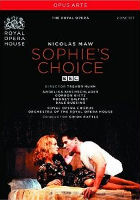Adapting a novel, especially a well known novel like Sophie’s Choice, by William Styron, can be a herculean task. The two conflicting, almost mutually exclusive, forces at work are the desire to create a great work for the stage, while at the same time remaining true to all the nuanced characterizations and storylines present in a lengthy work of literature. While some recent attempts at this have failed both muses, Nicholas Maw came very close to finding the perfect balance in his operatic version of Sophie’s Choice, premiered at Covent Garden in 2002. [Opus Arte
]
Maw’s sonorous palate is a wonderful combination of early 20th century German high-Romanticism and post-war British dissonance. As a Brit himself, Maw does share many compositional traits with Britten and Hindemith, but at the more dramatic times calls on thick and lush textures, reminiscent of Strauss, Korngold and Zemlinsky.
Under the able baton of Sir Simon Rattle, the Orchestra of the Royal Opera House gives a chilling and dramatic performance. Rattle’s ability in contemporary music is matched by few conductors in this world, and his command of this powerful work is awe-inspiring at the least.
The production, directed by Trevor Nunn, with sets by Rob Howell and lighting design by Mark Henderson, aptly create a dark and truthful mise-en-scène. Also, the inclusion of a Narrator in the opera to take the personified form of the narration in the novel created special problems for the coherent telling of the drama, which the production team ingeniously turns to their advantage.
Angelika Kirchschlager sings Sophie in this lengthy dramatic role for mezzo-soprano. The high tessitura could make this an eventual zwischenfach role should the piece be staged more often. Sophie is a role that seems to share more than just tessitura with Santuzza, but Ms. Kirchschlager manages the frequent long lines in her upper register with a free, powerful sound. She embodies the part of kunstdiva for this role, not relying only on beautiful sound but also yelling, crying, or the whispered plea for help. She manages to pace out her role better than many of her cast-mates, but still there are some vocal glitches in the performance, which was recorded live in 2004.
httpv://www.youtube.com/watch?v=NmDfLjHQ77c
Despite the strong performance by Ms. Kirchschlager, Rod Gilfry is absolutely the highlight of the show. His turn as the charming, frightening madman Nathan is laced with full voiced fury and courteous charm. His ringing, resonant voice is sure and clear, making the often violent Nathan seem all the more menacing.
Mr. Gilfry’s impressive physicality adds more fright to Nathan, towering over almost everyone on stage with is broad shoulders and athletic build. But this same build makes his suave courtship of Sophie all the more believable, especially when combined with the romantic darkness readily available in his voice.
Our Narrator, portrayed by Dale Duesing, ably moves the story along, filling in the gaps from the novel that simply couldn’t be included in the opera. Mr. Duesing has the kind of leathered, smokey voice that speaks of age and experience, making him a wonderful choice for the character living in his past glories and sadness.
His intense, sometimes manic acting provides a wonderful addition to the piece; tying all of the often out of order scenes into one coherent and moving tale. His somewhat ghostly appearance in some scenes blurs lines between reality and recollection, but always adds to the subplot and emotional depth of the piece.
As Stingo, Styron’s closely biographical character, and the young man who eventually becomes the narrator, Gordon Gietz sings with a steady and sure lyrical tenor, bumbling and affectionate in his naivete. As the piece progresses and he matures, you see the man he becomes, as well as the man he wanted to be, surmised in his soft and aching tone in Act IV.
Sadly this is where the budget seemed to end for singers of any real quality. Maybe it was on purpose, or possibly by some sub-conscious British grudge, but Jorma Silvasti as Rudolph Franz Hoess had one of the most strained, unappealing, tumultuous sounds I’ve ever heard outside of an undergraduate recital at some second rate music school. Stephanie Friede was also rather displeasing to listen to, with a strident and forced sound as the rebel Wanda.
But really, don’t let the shortcomings of small roles, or the rather substantial length and emotional gravity of the piece deter you from giving it a look. Certainly don’t expect to be enlivened and happy for the rest of the day, but this powerful piece is something to experience. I place it in the same category of work as Britten’s War Requiem; it requires a steadfast mind and willingness to be broken by the drama of the piece, to let yourself fall into the sadness of the reality of what happened.



